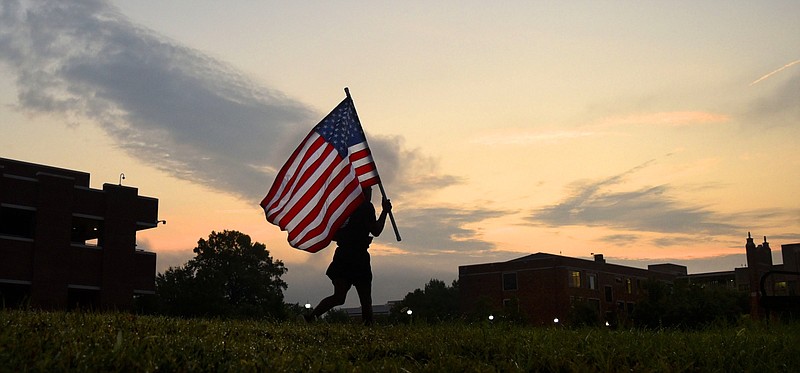The student government body at Grand Valley State University in Allendale, Michigan, voted in essence last week to remove the Pledge of Allegiance from its meeting agenda.
"We are representing a diverse population here, and that specific language doesn't sit with this diverse population and fully [represent] them," student Sen. Lansing Sánchez-Castillo said.
Last we checked, Michigan was in the United States. Whether that diverse population is composed of native-born students or international students, they should respect the country in which they reside and be willing to abide by its laws and precepts.
Grand Valley State is the second public university this semester to ban the pledge. The University of Oklahoma voted to remove the oath from its student government meeting in September.
The Michigan school's vote was 22 in favor, 10 opposed and 10 abstentions. Ten students, in other words, couldn't bring themselves to vote for removing the pledge but apparently were too cowardly to stand up for their country or be on record with an opinion.
Student Senate spokesman Ryan Fritz told MLive the words are not only non-inclusive to international student but also to non-religious or non-Christian students.
"A lot of students didn't feel comfortable with the 'under God' aspect of the pledge," he said.
However, no students are forced to stand or recite the pledge, and no issues were raised over its use during the spring semester, students said.
We don't believe students would get very far if they "didn't feel comfortable" about a warning on their syllabus that their grade would drop if they had more than three unexcused absences, or that class participation would count as 25% of their grade.
Neither do we believe they would still be in school if they said they "didn't feel comfortable" about paying their tuition and fees.
Student Sen. Dorian Thompson said an administrator told him some alumni are angry about the pledge being eliminated, angry enough to pull their funding.
The Grand Valley State senior said student Senate committee chairs and vice chairs had "secretly" decided to eliminate the pledge before the semester started, similar to the way some U.S. Democrats did earlier this year in preventing witnesses from adding "so help me God" to the oaths they take.
The most infamous of those was by Tennessee's own Rep. Steve Cohen, D-Memphis, who would not permit a witness to use the words in a House Judiciary Subcommittee on the Constitution, Civil Rights and Civil Liberties in February.
Thompson noticed the pledge was missing when meetings resumed this fall, and he made a motion to return it to the agenda, setting the stage for the aforementioned vote. He says his fight's not over, though.
Yet, we wonder, what could be so odious in the pledge that it had to be banned?
* "Allegiance?" One is committing loyalty to a country, which seems the least one could do for a nation that has given each of us so much.
* "The republic for which its stands?" The flag stands for a country that is the freest and most generous in the world. What's not to appreciate about such a republic?
* "One nation?" A united group of states, standing as one, is much stronger than factions, races, cultures, genders or sexual orientations attempting to create a group of ideological bodies, each with its own sets of facts, dos and don'ts, and beliefs.
* "One nation under God?" Despite those who would try to tell you differently, the U.S. was founded by individuals who had a great belief in God and his sovereignty. Those who don't believe in a specific deity surely can substitute their own higher power when hearing the phrase.
* "Indivisible?" We say we are unable to be divided, that as a nation we will stand together, that we will put the good of our country above our own good at times to preserve it.
* "With liberty and justice for all?" The liberties we enjoy in this country are the envy of much of the rest of the world, and we should resolve to preserve them. Individuals can parse the word "justice" to argue about whether we truly have it for all, but millions of people across the world would give anything to have the justice found by people in the U.S.
The lives of the members of Grand Valley State's student government body will not be dramatically changed if they do not recite the Pledge of Allegiance. But, eventually, they'll find that if they don't stand for something so valuable, they're liable to fall for anything.
